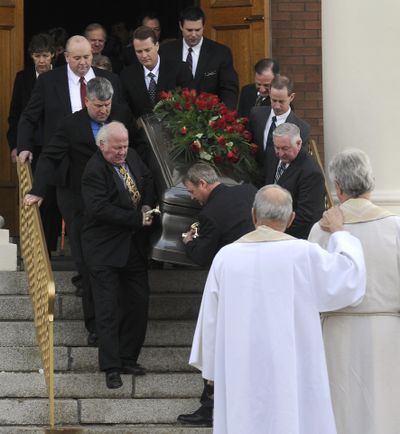Magnuson remembered as generous giant

Harry Magnuson was a local legend in North Idaho and Spokane, where his financial support and tenacity preserved the Cataldo Mission, kept the interstate freeway from running through downtown Wallace, and saved Gonzaga University from financial collapse.
But at home, among his children and grandchildren, Magnuson was just dad and grandpa, his son, John Magnuson, said in a eulogy at his father’s funeral Thursday.
“We know our father was an icon, the stuff of legend,” John Magnuson said. He added, “He had a heart the size of Idaho. If there was a Mt. Rushmore in Idaho, Harry Magnuson would be on it.”
Magnuson’s mass of Christian burial was held Thursday at Gonzaga University’s St. Aloysius Church following a Wednesday night vigil in his beloved hometown of Wallace. Magnuson died Saturday at age 85.
Everyone who spoke at or attended the packed service seemed to have a Harry Magnuson story.
His son, John, told this one: Every Dec. 29, Magnuson would tell his children the story of how he met their mother, on that day in 1947. Colleen Burns had come into a Wallace bar with a friend to buy some Cokes and caught Magnuson’s eye. He asked the bartender for her name, and the bartender brought Magnuson the $2 check she’d written.
His father kept that check under lock and key until the day he died, John Magnuson said. The couple was married almost 59 years.
Magnuson was born and raised in Wallace and returned to his hometown after serving in the Navy during World War II and after completing his master’s degree in business administration at Harvard University. He set up a business as a public accountant, but quickly branched out into mining and real estate. His company’s investments grew to include banks, hotels and shopping malls throughout the Inland Northwest.
Magnuson received numerous awards and honorary degrees – recognizing his contributions to historic preservation, community service and business and industry. In 1969, Magnuson was one of the first three lay trustees appointed to the governing body at Gonzaga. He served as a trustee for 41 years and was chairman of the board from 1970 to 1975.
Magnuson was described as an eternal optimist, a protector, and generous to a fault with his resources. He was called a giant among men whose big heart was sometimes overlooked. A devout lifelong Catholic, Magnuson’s efforts were far-reaching, influential and – as evidenced at the service – inclusive. Representatives from the Coeur d’Alene Tribe of Indians draped Magnuson’s casket with a tribal blanket, a custom in their traditions, said former Chairman Ernie Stensgar.
Magnuson was a great friend to the tribe, helping preserve the tribe’s beloved Cataldo Mission, assisting tribal youth in attending Gonzaga, and supporting tribal causes with his considerable political clout, Stensgar said.
Years ago, before the tribe built the casino that would secure its financial fortune, Magnuson offered the tribe the opportunity to buy a large piece of undeveloped land on the west side of Lake Coeur d’Alene, at 16-to-1 Bay. Stensgar was certain Magnuson had many more lucrative offers.
“He made a deal so we could afford to purchase that land,” Stensgar said. “He gave so much to the tribe.”
Almost two dozen priests assisted with Magnuson’s service, including Bishop Michael Patrick Driscoll, of the Diocese of Boise, who presided.
Joe Peak, owner of the Silver Valley’s Enaville Resort, said his son, the Rev. Jimmy Peak, was the youngest priest at the altar. When his son wanted to become a priest but couldn’t afford to attend Gonzaga, Peak said, somehow the grants and financial assistance he needed came through. He never knew for sure, Peak said, but he always suspected the hand of Harry Magnuson.
“I know Mr. Magnuson knew about that. Mr. Magnuson, in his very subtle way, he never talked about it, he never bragged about it. It was just one of those things. He was a consummate giver,” Peak said. “Only God and Harry will know how much giving he did and how many people he reached.”
The Rev. Bernard Coughlin, a former Gonzaga president, said he first met Magnuson 35 years ago when he invited Coughlin to become the school’s new president. Coughlin said Magnuson took over leadership of the board at a time the school was grossly in debt and bankers were walking away.
“He personally guaranteed the university’s debt,” Coughlin said, and continued to serve on the board until he died. “He was a giant, but I think many missed the heart of the giant.”
Current Gonzaga president, the Rev. Robert Spitzer, said he researched the meaning of the word Magnuson. “The word literally means ‘the great one.’ I’m not kidding. (Magnuson) was a great one because of his successes, but also because of his great love,” Spitzer said.
“He really was a good shepherd. Harry was a protector. He was a sheep dog,” Spitzer said. “He was protecting Gonzaga. He was protecting his family. He was protecting the Cataldo Mission. He was protecting Wallace.
“Harry’s relentless optimism always won the day,” Spitzer said.
Several speakers mentioned Magnuson’s infamous “memos” – notes he’d write with clippings or other reference materials attached. In an interview after the service, former state Sen. Mary Lou Reed said she was among those who received the notes.
“He kept track of an incredible number of issues and people,” Reed said. “It was an impressive multi-layered life that he led. It was all reflected today.”
Many speakers referred to Magnuson as a “giant” among men, and he was, Reed said. “He was a leader in so many different ways. But he was really a very modest man. He was always just a very nice person. Harry Magnuson really, to many of us, is Idaho.”